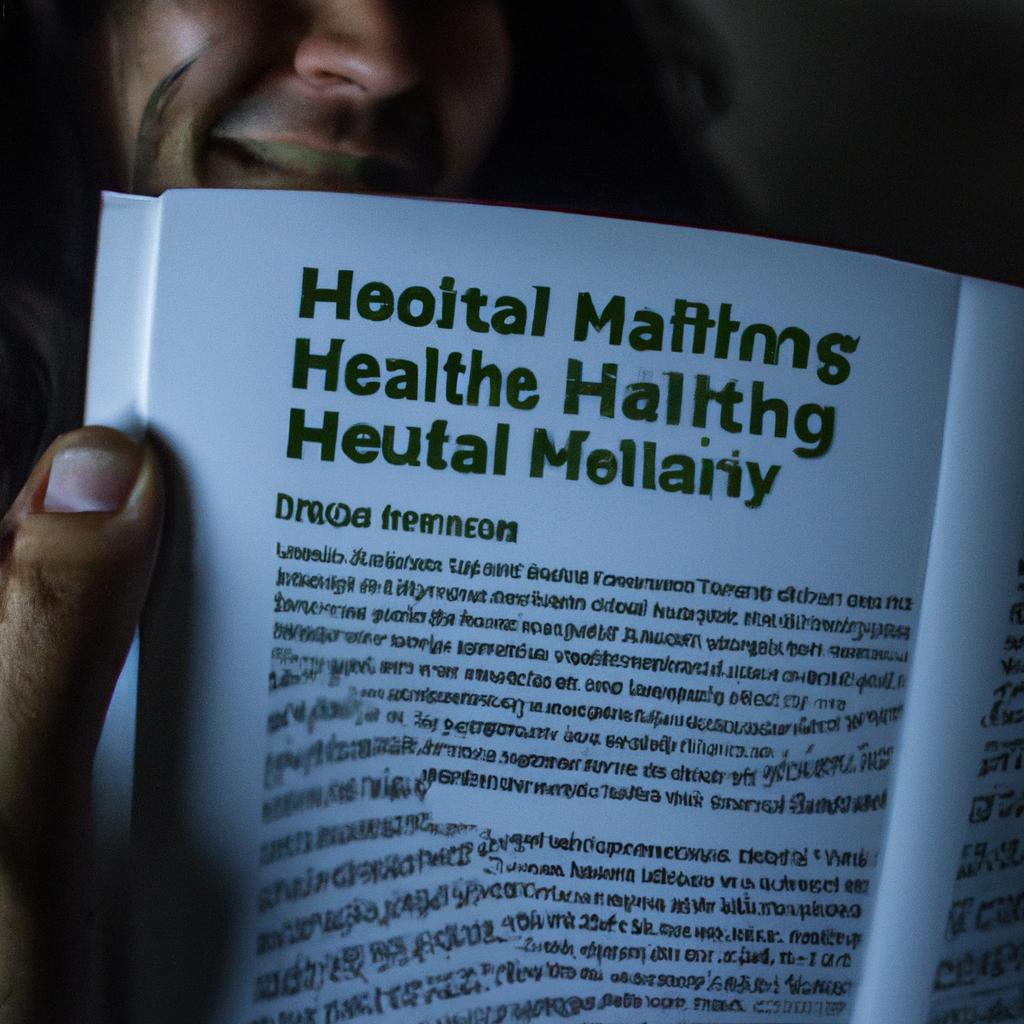Depression is a complex and debilitating mental health condition that affects millions of individuals worldwide. It can manifest in various forms, such as persistent sadness, loss of interest or pleasure, feelings of guilt or worthlessness, disrupted sleep patterns, and changes in appetite. Treatment options for depression are crucial to alleviate symptoms and improve overall well-being. In this article, we will explore the different mental health solutions available for individuals struggling with depression.
Consider the case of Sarah, a 35-year-old woman who has been experiencing symptoms of depression for several months. She finds it increasingly difficult to engage in her usual activities and experiences frequent episodes of overwhelming sadness. These symptoms have significantly impacted her personal and professional life. To address Sarah’s situation effectively, it becomes essential to explore treatment options that encompass both pharmaceutical interventions and psychotherapeutic approaches.
Pharmaceutical interventions play a significant role in managing depression by targeting specific neurotransmitters within the brain. Medications such as selective serotonin reuptake inhibitors (SSRIs) are commonly prescribed due to their effectiveness in regulating mood and reducing depressive symptoms. However, while medication can be beneficial for many individuals, it is important to recognize that each person may respond differently to different medications. Additionally, some individuals may experience side effects or find limited effectiveness with certain medications. Therefore, it is essential for Sarah to work closely with a healthcare professional to find the most suitable medication and dosage for her specific needs.
In addition to pharmaceutical interventions, psychotherapeutic approaches are crucial in addressing the underlying causes of depression and developing coping strategies. Cognitive-behavioral therapy (CBT) is one of the most widely used and evidence-based forms of therapy for depression. CBT focuses on identifying and challenging negative thought patterns that contribute to depressive symptoms while promoting healthier ways of thinking and behavior. By working with a qualified therapist, Sarah can learn effective coping skills, improve problem-solving abilities, and develop a more positive outlook on life.
Other forms of therapy that may be beneficial for individuals with depression include interpersonal therapy (IPT), which focuses on improving relationships and social support systems, as well as psychodynamic therapy, which explores unconscious conflicts that may contribute to depressive symptoms. It is important for Sarah to discuss these options with her therapist or mental health professional to determine the best course of treatment based on her individual circumstances.
In addition to medication and therapy, lifestyle changes can also play a significant role in managing depression. Regular exercise has been shown to release endorphins, which are natural mood elevators. Engaging in activities that bring joy or a sense of accomplishment can also help alleviate depressive symptoms. Maintaining a healthy diet and ensuring adequate sleep are also important factors in supporting overall mental well-being.
It is worth noting that recovery from depression is not always linear, and it may take time to find the right combination of treatments that work best for each individual. Therefore, patience and ongoing support from loved ones are crucial throughout the treatment process.
Overall, treating depression requires an integrated approach that combines pharmaceutical interventions, psychotherapy, lifestyle changes, and ongoing support. By working closely with healthcare professionals and implementing these strategies tailored to their specific needs, individuals like Sarah can effectively manage their depression and regain a sense of well-being.
Medication-based treatments
Medication-based treatments have long been a cornerstone of managing depression. One example is the case study of Sarah, a 35-year-old woman who has been experiencing persistent feelings of sadness and fatigue for several months. After consulting with her healthcare provider, she was prescribed an antidepressant medication known as selective serotonin reuptake inhibitors (SSRIs). Within a few weeks of starting the medication, Sarah noticed a significant improvement in her mood and energy levels.
There are several reasons why medication-based treatments may be recommended for individuals with depression. Firstly, medications can help to rebalance certain chemicals in the brain that are believed to play a role in regulating mood, such as serotonin or dopamine. By restoring these imbalances, medications aim to alleviate depressive symptoms and improve overall well-being.
- Medications can provide relief from common symptoms of depression, including low mood, lack of interest or pleasure in activities, changes in appetite or sleep patterns.
- They can be especially helpful for individuals whose depression is severe or does not respond adequately to other forms of treatment.
- Medication-based treatments can also assist in reducing suicidal thoughts and behaviors associated with severe depressive episodes.
- For some individuals, medications may serve as a temporary solution during acute phases of depression while they engage in complementary therapies.
The effectiveness and safety of different types of antidepressant medications vary depending on individual circumstances. Therefore, it is essential for individuals to work closely with their healthcare providers to find the most suitable option based on factors such as medical history, potential side effects, and personal preferences.
Moving forward into the next section about psychotherapy approaches allows patients to explore additional avenues towards recovery beyond pharmacological interventions.
Psychotherapy
Imagine a person named Sarah who has been struggling with depression for several months. She has tried medication-based treatments, but she is still looking for additional options to manage her symptoms and improve her overall well-being. In addition to medications, psychotherapy can be an effective treatment option for individuals like Sarah.
Psychotherapy, also known as talk therapy or counseling, involves working with a trained mental health professional to explore and address the underlying causes of depression. This therapeutic approach aims to help individuals develop coping strategies, gain insight into their thoughts and emotions, and make positive changes in their lives.
Here are some key points about psychotherapy:
- It provides a safe space where individuals can openly express their feelings, concerns, and experiences.
- The therapist helps clients identify negative thought patterns and behaviors that contribute to their depressive symptoms.
- Different types of psychotherapy exist, including cognitive-behavioral therapy (CBT), interpersonal therapy (IPT), psychodynamic therapy, and mindfulness-based therapies.
- Research suggests that psychotherapy can be as effective as medication in treating certain types of depression.
To further understand the effectiveness of different psychotherapeutic approaches in managing depression, let’s explore a comparison table:
| Therapeutic Approach | Key Features | Benefits |
|---|---|---|
| Cognitive-Behavioral Therapy (CBT) | Focuses on identifying and changing negative thinking patterns | Helps individuals learn new skills for managing distressing situations |
| Interpersonal Therapy (IPT) | Emphasizes improving communication and relationship skills | Addresses social issues contributing to depressive symptoms |
| Psychodynamic Therapy | Explores unconscious conflicts influencing one’s emotional state | Aims at gaining insight into deeper psychological processes |
| Mindfulness-Based Therapies | Promotes present-moment awareness through meditation techniques | Helps individuals develop self-compassion and reduce stress |
As Sarah continues her journey towards finding the most suitable treatment option, cognitive-behavioral therapy (CBT) offers a promising path. CBT focuses on identifying and changing negative thinking patterns, which can significantly impact an individual’s mood and behavior. By challenging irrational thoughts and developing healthier coping strategies, Sarah may experience relief from depressive symptoms.
In the following section, we will delve into the principles of cognitive-behavioral therapy (CBT) and its role in treating depression without relying solely on medication.
Cognitive-behavioral therapy (CBT)
Treatment Options for Depression: Cognitive-behavioral therapy (CBT)
Imagine a young woman named Sarah who has been struggling with persistent feelings of sadness and hopelessness. Despite her best efforts, she finds it increasingly difficult to engage in activities that once brought her joy. Recognizing the need for professional help, Sarah seeks out cognitive-behavioral therapy (CBT) as a potential treatment option for her depression.
Cognitive-behavioral therapy is a widely utilized psychotherapeutic approach aimed at helping individuals identify and modify negative thought patterns and behaviors associated with their mental health challenges. By working collaboratively with a trained therapist, clients like Sarah can gain insight into their thinking processes and develop more adaptive coping strategies.
There are several key components of CBT that contribute to its effectiveness in treating depression:
- Cognitive restructuring: This technique involves challenging and replacing negative thoughts with more realistic and positive ones. Through guided questioning, individuals learn to recognize distorted thinking patterns that contribute to their depressive symptoms.
- Behavioral activation: Encouraging engagement in pleasurable or rewarding activities can help combat the withdrawal often experienced by those living with depression. By gradually reintroducing these activities into their lives, individuals may experience an improvement in mood and overall well-being.
- Skills training: CBT provides individuals with practical tools and techniques they can use to manage stress, regulate emotions, improve communication skills, and enhance problem-solving abilities.
- Homework assignments: Between sessions, therapists often assign homework exercises designed to reinforce concepts learned during therapy sessions. These assignments encourage active participation from clients outside of therapy hours.
To illustrate the impact of cognitive-behavioral therapy on individuals battling depression, consider the following hypothetical case study:
| Client | Symptoms Before CBT | Symptoms After CBT |
|---|---|---|
| John | Persistent sadness; lack of motivation; social withdrawal | Improved mood; increased motivation; improved social functioning |
| Mary | Negative self-image; feelings of worthlessness | Enhanced self-esteem; positive self-perception |
| David | Difficulty sleeping and concentrating; loss of appetite | Improved sleep quality; increased focus and concentration |
Through the combination of cognitive restructuring, behavioral activation, skills training, and homework assignments, CBT has proven to be an effective treatment option for individuals like Sarah who are living with depression. The next section will explore another therapeutic approach known as electroconvulsive therapy (ECT) and its potential benefits in managing severe depressive symptoms.
Electroconvulsive therapy (ECT)
Electroconvulsive Therapy (ECT)
In certain cases where other treatments have not been successful, electroconvulsive therapy (ECT) may be considered as an alternative treatment option. ECT involves the administration of electric currents to the brain, which intentionally induces a brief seizure. While it may sound intimidating, ECT has proven effective in treating severe depression that does not respond well to medication or psychotherapy.
One example of the success of ECT is the case study of Emily, a 35-year-old woman who had been battling treatment-resistant depression for several years. Despite trying various medications and therapies, her symptoms persisted and significantly impacted her quality of life. After undergoing a series of ECT sessions, Emily experienced significant improvement in her depressive symptoms, leading to enhanced functioning and overall well-being.
While ECT can be highly effective for some individuals, it is important to consider potential risks and side effects associated with this treatment approach. Here are some key points to note:
- Anesthesia: General anesthesia is administered prior to each session to ensure patient comfort.
- Memory Loss: Short-term memory loss is a common side effect following ECT sessions but typically improves over time.
- Muscle Aches: Some patients may experience muscle soreness after the procedure due to the induced seizure activity.
- Relapse Prevention: To maintain long-term benefits, follow-up treatments or maintenance therapy might be recommended.
To provide further insight into ECT as a treatment option for depression, refer to the following table outlining its advantages and considerations:
| Advantages | Considerations |
|---|---|
| High efficacy rates | Potential cognitive side effects |
| Rapid symptom relief | Need for multiple sessions |
| Suitable when other treatments fail | Stigma surrounding ECT |
| Can be used during pregnancy | Possible physical discomfort |
As we explore additional treatment options for depression, it is important to consider Transcranial Magnetic Stimulation (TMS) as a potential alternative. TMS utilizes magnetic fields to stimulate specific regions of the brain associated with mood regulation, offering another avenue for individuals seeking relief from depressive symptoms.
Transcranial magnetic stimulation (TMS)
Imagine a hypothetical scenario: Sarah, a 35-year-old woman who has been struggling with treatment-resistant depression for several years. Despite trying various medications and therapies, her symptoms continue to persist, severely impacting her daily life. In situations like these, alternative treatments such as repetitive transcranial magnetic stimulation (rTMS) may offer hope.
Definition and Procedure
rTMS is a non-invasive procedure that involves the use of electromagnetic coils placed on the scalp to deliver brief pulses of magnetic fields. These pulses stimulate specific regions of the brain associated with mood regulation, targeting areas believed to be underactive in people with depression. The procedure typically requires multiple sessions over several weeks.
Benefits and Considerations
- rTMS offers potential benefits for those who have not responded well to traditional treatments.
- It does not require anesthesia or sedation, allowing individuals to remain awake during the procedure.
- Side effects are generally mild and temporary, including headache or discomfort at the site of stimulation.
- A personalized treatment plan is developed based on individual needs and response.
| Potential Benefits | Considerations |
|---|---|
| Non-invasive | Requires commitment |
| No systemic side effects | Availability may vary |
| Minimal discomfort | Individual responses vary |
| Personalized treatment approach | May not be suitable for all |
Effectiveness and Future Directions
Research suggests that rTMS can provide significant relief from depressive symptoms when used as an adjunctive treatment alongside medication or psychotherapy. However, its long-term effectiveness is still being studied, and more research is needed to fully understand its potential benefits and limitations. Ongoing advancements in technology hold promise for improved outcomes.
Transitioning into the subsequent section about “Lifestyle changes and self-care,” it becomes evident that while medical interventions like rTMS can be valuable, they are often most effective when combined with holistic approaches that address various aspects of a person’s life. By incorporating lifestyle changes and engaging in self-care practices, individuals can enhance their overall well-being and augment the effects of medical treatments.
Now let us explore the significance of these lifestyle modifications and self-care strategies to complement depression treatment.
Lifestyle changes and self-care
Integrative Approaches to Depression Treatment
In recent years, there has been an increasing recognition of the importance of integrating various treatment approaches for depression. One promising method that has gained attention is Transcranial Magnetic Stimulation (TMS), a non-invasive procedure that uses magnetic fields to stimulate specific areas of the brain. However, it is essential to explore other alternatives as well in order to provide comprehensive mental health solutions.
To understand the significance of considering multiple avenues for treating depression, let us consider a hypothetical case study. Sarah, a 35-year-old woman diagnosed with major depressive disorder, had been struggling with persistent feelings of sadness and hopelessness despite receiving traditional medication therapy. Seeking additional options, she was introduced to TMS as part of her integrative treatment plan. The combination of medication and TMS proved effective in significantly reducing her symptoms and improving overall quality of life.
When exploring alternative treatments for depression, it is crucial to incorporate lifestyle changes and self-care practices into the holistic approach. Here are some strategies that have shown promise:
- Regular exercise: Engaging in physical activities such as jogging or yoga can release endorphins and boost mood.
- Mindfulness meditation: Practicing mindfulness techniques helps individuals become more aware of their emotions and develop coping mechanisms.
- Social support: Building strong connections with friends, family members, or support groups fosters emotional resilience.
- Balanced diet: Consuming nutritious foods rich in omega-3 fatty acids may positively impact mood regulation.
To illustrate the potential benefits of these strategies further, consider the following table showcasing how each lifestyle change contributes to managing depression:
| Lifestyle Change | Benefits |
|---|---|
| Regular Exercise | – Releases endorphins |
| – Improves sleep quality | |
| Mindfulness Meditation | – Enhances emotional awareness |
| – Reduces stress levels | |
| Social Support | – Provides emotional comfort and empathy |
| – Offers a sense of belonging | |
| Balanced Diet | – Supports brain health |
| – Regulates neurotransmitter production |
By adopting an integrative approach to depression treatment, individuals like Sarah have a better chance of finding effective solutions. It is important for mental health professionals to consider the potential benefits of combining different techniques tailored to each person’s unique needs. Through such comprehensive care, we can foster hope and provide holistic support in the journey towards improved mental well-being.




